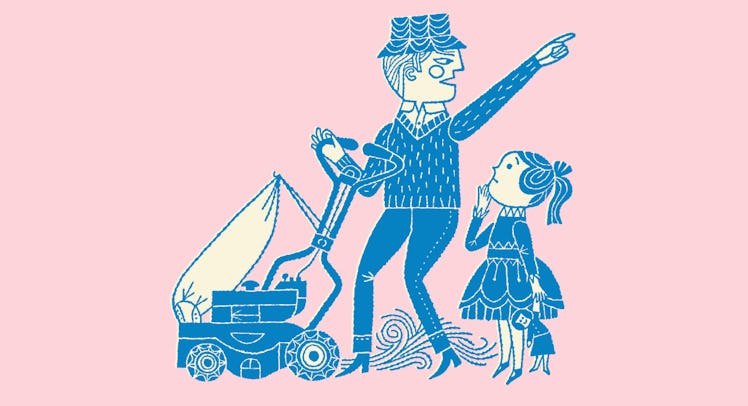Why Parents Yell At Kids Even Though It's Harmful To Development
It's not totally your fault.

You’ve probably heard that yelling at your kids can change how their brains develop (not in a good way) but the realities of raising little people make raised voices somewhat inevitable. You don’t want to damage your kid, but you also want them to know just how unhappy you are that one of their rogue Legos is embedded in your foot.
Look, it’s going to happen. You’re gonna yell. But understanding why you scream at your kids can help you keep it to a minimum, and ensure that your children grow up around mostly friendly voices—with only the occasional bellow.
You think you’re protecting them
Anger often gets a bad rap, Julienne B. Derichs, a clinical family counselor, told Fatherly. “It exists to mobilize the instinctual fight-or-flight response meant to protect us from danger.” That’s why animal parents are pretty much only aggressive with their offspring when they’re trying to stop them from attracting predators. It’s the animal equivalent of screaming at your kids just as they’re about to chase a ball into oncoming traffic or fall off a cliff.
Unfortunately, modern human parents often yell to protect themselves and their children from any perceived threat—even when those threats don’t place anyone in danger. Parents may scream at their kids to stop them from behaving in a way that causes others to judge them, for instance. But if it isn’t a matter of safety, it probably isn’t worth it.
You think they’re pissing you off on purpose
When parents yell at their kids, it’s often because they forget that children—unlike their significant others and colleagues—are seldom trying to get under their skin. Instead, they’re testing their limits and exploring their environments. Even when your kids are trying to upset you, it’s not because they want you to be upset—it’s because their brains are developing, and they’re trying to figure out what upsets people. So we yell, under the mistaken belief that our kids “are doing something purposeful to cross the boundaries,” Derichs says “When, in many cases, children are learning and exploring their environments.” When your kids test your limits they may make you want to “turn this damn car around”. But it pays to keep in mind that it’s just a symptom of their brains developing properly.
You got yelled at as a kid
Many people yell at their kids simply because their parents yelled at them, and their parents yelled at them, and so on. Some parents do it on purpose, because they think that this no-yelling mumbo jumbo doesn’t prepare children for real-world trauma. But that’s only because they (and their own parents) never learned to cope without raising their voices. “You think you’re preparing them for something you experienced,” Bruce Bibee, an addiction and recovery counselor, told Fatherly. The reality is, you may have found a better way to cope if you had not been yelled at as a kid.
Try breaking the cycle—there are better ways to cope than raising your voice.
It just feels good
Anger and yelling can trigger dopamine reward receptors in the brain—and in that way, your addiction to yelling is not much different from your addiction to gambling, alcohol, or extreme sports, according to Dr. Jean Kim, a psychiatrist with the U.S. Department of Health and Human Services. “Anger can become its own reward,” she wrote in Psychology Today. “But like other addictions, the final consequences are dangerous and real, and people follow impulses in the moment without regard to the big picture.” Those consequences become more apparent when your kid is on the receiving end. So yell if you must—but keep it in the car, alone, with the windows up. Far away from little ears.
This article was originally published on